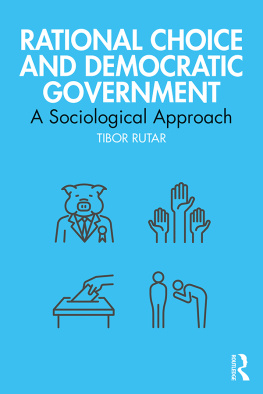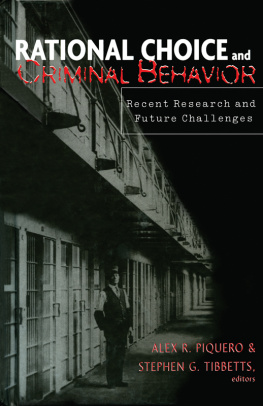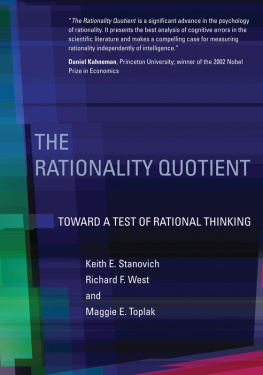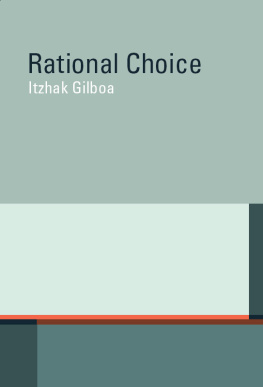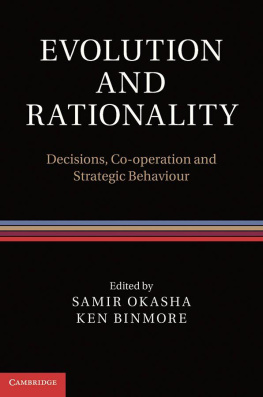Originally published in 1986 by Springer-Verlag.
Published 2014 by Transaction Publishers
Published 2017 by Routledge
2 Park Square, Milton Park, Abingdon, Oxon OX14 4RN
711 Third Avenue, New York, NY 10017, USA
Routledge is an imprint of the Taylor & Francis Group, an informa business
New material this edition copyright 2014 by Taylor & Francis.
All rights reserved. No part of this book may be reprinted or reproduced or utilised in any form or by any electronic, mechanical, or other means, now known or hereafter invented, including photocopying and recording, or in any information storage or retrieval system, without permission in writing from the publishers.
Notice:
Product or corporate names may be trademarks or registered trademarks, and are used only for identification and explanation without intent to infringe.
Library of Congress Catalog Number: 2013025235
Library of Congress Cataloging-in-Publication Data
The reasoning criminal: rational choice perspectives on offending / Derek B.
Cornish and Ronald V. Clarke, editors; with a new introduction by Ronald V.
Clarke.
pages cm
Includes bibliographical references and index.
ISBN 978-1-4128-5275-3
1. Criminal psychology--Congresses. 2. Criminology--Congresses.
3. Decision making--Congresses. 4. Choice (Psychology)--Congresses.
I. Cornish, Derek B. (Derek Blaikie), 1939- II. Clarke, R. V. G.
HV6080.R38 2014
364.3--dc23
2013025235
ISBN 13: 978-1-4128-5275-3 (pbk)
Ronald V. Clarke
The Reasoning Criminal, in which Derek Cornish and I described a "rational choice perspective" (RCP) on crime, was first published in 1986. It soon went out of print and remained unavailable for twenty-five years until Transaction Publishers decided to produce this new edition. Two new books have also appeared this year intended to mark The Reasoning Criminal's original publication: Affect and Cognition in Criminal Decision Making (Van Gelder et al. 2013) and Cognition and Crime (Leclerc and Wortley 2013). The first book explores the scope for enrichment of the RCP by inclusion of recent findings about emotions, moods, and instinctual responses such as sexual arousal and anger, while the second presents a series of contributions on script analysis, the widely used concept developed by Derek Cornish (1994) after the original publication of the RCP.
In the introductory chapter to their book, Leclerc and Wortley state that: "The rational choice perspective has in equal measure been one of the most influential and criticised criminological models to emerge in the latter quarter of the twentieth century." (Leclerc and Wortley, 2013:3). As to the RCP's influence, they note that most criminology textbooks now devote an entire chapter, or chapter section, to the RCP and that: " The Reasoning Criminal has over 1,000 citations listed in Google Scholar, a figure that does not include citations to individual chapters within the edited collection." (Leclerc and Wortley, 2013:5).
Leclerc and Wortley distinguish two kinds of criticisms, theoretical and ideological. The latter have portrayed the RCPs advocates as politically conservative, administrative criminologists (Young 1994), who ignore the root causes of crime (such as poverty and relative deprivation) and thereby undermine the social reform agenda of sociological criminology. Furthermore, the administrative criminologists repressive model of crime will contribute to an unfair and divided society. Some of these critics (for example Akers, 1990) assume that the principal policy objective of the RCP is to strengthen punishment, which directly contradicts the fact, clearly stated in The Reasoning Criminal, that the RCP was intended to provide a more secure theoretical underpinning for situational crime prevention.
Derek Cornish and I chose not to respond piecemeal to these ideological criticisms, but we have answered them in review chapters (Cornish and Clarke, 2001, 2006, 2008) and they need claim no more of our attention here. The theoretical criticisms deserve more discussion, though they too were answered in the review chapters and in those by other authors (for example: Clarke and Felson 1993, 2011; Opp 1997; Felson and Clarke 1998, Farrell 2010). These criticisms mostly center on the presumption of offender rationality, which has been challenged on a variety of grounds, which include: (1) some crimes are "random" acts of violence and vandalism and therefore devoid of rational benefits; (2) offender's choices can hardly be rational when they are so often self-defeating (for example resulting in arrest and imprisonment); (3) some crimes such as sexual abuse are not the product of rational calculation but of deep-seated drives; (4) some crimes are motivated not by instrumental motives but by "existential" reasons such as thrill seeking; and (5) many impulsive and aggressive crimes are the result not of cool calculation, but of heightened emotional states such as rage or sexual arousal.
These limits on rationality are, in fact, easily accommodated within the RCP's "bounded" model of decision making (Simon 1978), under which rational is defined as purposive behavior, chosen to benefit the offender in some way. Compared with economic models, this sets a low bar for rationality and it would readily encompass, for example:
- offenders who take account of only a few benefits and risks at a time
- those who give only limited time and effort to a decision, especially when under the influence of drugs, alcohol or strong emotions
- those unduly influenced by the rewards of crime not its potential costs
- Those who might consider only the chances of being apprehended not the punishments that would await them
- those who react almost instantly to an insult or a challenge
To repeat, it matters only to the RCP that the offender chooses to commit a crime in the expectation of a resulting benefit. For example, offenders who instantly attack those who insulted them, could have chosen instead to name-call or to leave the scene to fetch a weapon. That they attacked was most likely the result of a split-second judgment that they would win the ensuing fight. However quick this decision, it would still fall within the RCP's definition of rational. Leclerc and Wortley's conclusion to their review of the theoretical criticisms made of the RCP is therefore undoubtedly correct: "Suffice to say it seems clear that in many cases critics are responding to what they assume the rational choice perspective is about rather than to what Cornish and Clarke have actually said." (Leclerc and Wortley, 2013:4). As an aside, perhaps Derek Cornish and I might have avoided much fruitless criticism had we called the RCP, the Bounded Rational Choice Perspective (BRCP), which might have signaled at least to some potential critics that our version of rational choice was different from the conventional economic model.



